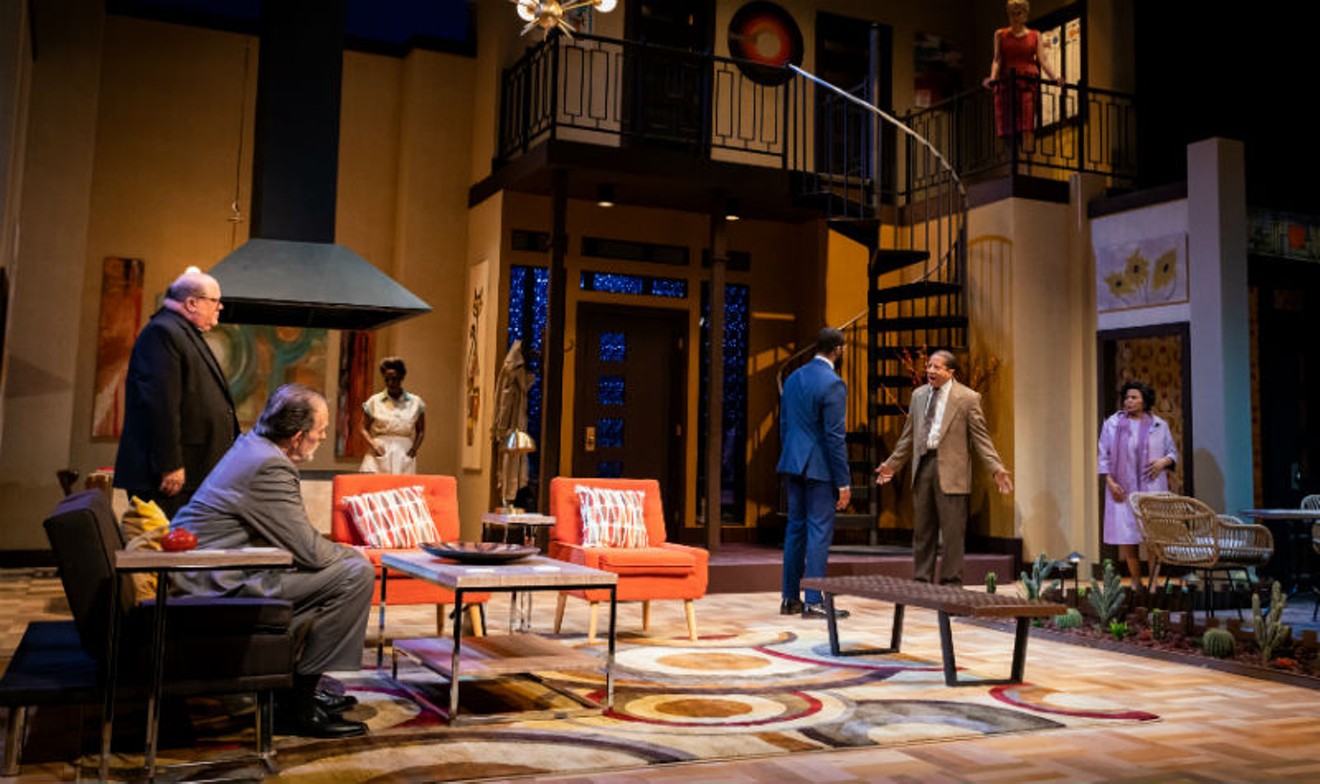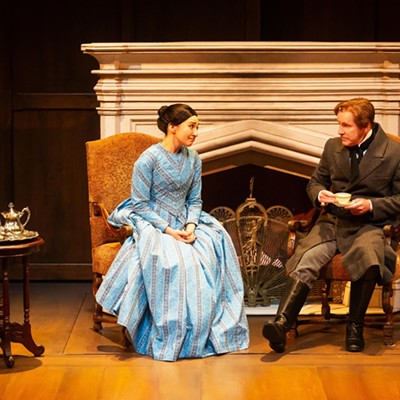I'm not sure I can accurately give a review of A.D. Players' Guess Who's Coming to Dinner because I'm fairly certain I didn't see all of it.
I was completely dumb-struck by Kirk A. Domer's luscious – and I mean luscious – set design for the Drayton's swanky mid-century aerie home in the San Francisco hills, and I spent a great deal of time mentally rearranging my furniture from home to see where it might fit into these swell new digs.
The place is stunning, and I'm moving in.
If you're a fan of HGTV, you, too, will join me. An immense cantilevered skylight anchors the room, as does its opposite focal point, the stone hearth and open fireplace that separates living room from dining room. The floors are polished stonework or wood; I couldn't tell since they are covered by huge patterned rugs of artful design. The doors are paneled with horizontal panes of glass, an iron staircase winds up to the bedroom level, niches with tasteful objets d'art fill the walls, the light fixtures are those cool atomic chandeliers, classy modern art graces the walls, painted tile edges the bar counter.
This place speaks power and money and class. Oh, there's a play going on inside it. Better pay attention.
If you're of a certain age, you'll remember this Oscar-winning film (1967), directed by Stanley Kramer and written expressly for the screen by William Rose, which caused a bit of a row when it was released. Starring Katherine Hepburn (who won an Oscar for Best Actress) and Spencer Tracy, as upper-crust liberals Christina and Matt Drayton in their last film partnership; it also starred Sidney Poitier, and he's the one coming for dinner.
The Drayton daughter Joanna has fallen in love with John Prentice, an exceptional doctor on vacation in Hawaii. They want to marry and see no problem with this at all – hey, it's the '60s, peace and love, man.
That's when the complications fall neatly into line. The idea of interracial marriage was quite controversial back in the old days of nascent hippiedom – it was forbidden in at least 17 states – so Kramer and Rose hit a big red button with this topic. Kramer always liked to tweak his audiences with grand social problem issues: Ship of Fools, The Defiant Ones, Judgment at Nuremberg, On the Beach, High Noon, Inherit the Wind. With its high gloss production and equally glossy stars, Dinner was a success, even in the South where the film maker was assured his film would be banned.
Todd Kreidler's adaptation of Rose's original is as faithful a xerox as you could want. While the high-powered team of Hepburn and Tracy is nearly impossible to replicate, the facsimiles on view at the George Theater are mighty fine. And I'd appreciate their work more had I stopped drooling over the set.
This being a very well-made play, there have to be more complications than just a saintly black doctor to shock this very white liberal family. So the table is set for another pair to join them, John's family, the more conservative middle-class Prentices. Joanna has secretly invited them before the young couple fly off to Europe where they plan to marry. Also thrown into the mix is wise family pastor, Monsignor Ryan, as voice of reason and compassion. And let's not forget sassy maid Tillie, who spots a potential hustler in John and is none-too-keen on losing her favorite. Everybody has little prejudices to trip up the couple, but naturally all is resolved after a few bruising revelations and paternal nitpicks.
John Feltch and Elizabeth Marshall Black are the conflicted Draytons, oozing warmth and personal aplomb, as their parental teachings of tolerance and diversity come back to haunt them. Mom is quicker to come around to the marriage, but Dad sees problems ahead and is level-headed to spot them and lay them out forthrightly. Kedrick Brown, like Poitier before him, is hobbled a bit with playing a character who has no flaws. He plays it well indeed: strong, secure, resolute. Haley Hussey has a harder time as dewy Joanna. Although younger than John, she seems too flighty, somewhat unglued. Step it down a notch.
Michelle Harrell and David Rainey, as John's solid old-world parents, add spice as people out of their element in both situation and environment. Rainey's confrontation with John – John's famous “You see yourself as a black man, I see myself as a man” – is deftly handled, and the audience went deathly silent. Harrell has her moment when she asks, politely but with a twinge of remorse, if the fathers in the room have forgotten passion and what's it's like to be in love.
Kaci M. Fannin, as Tillie, nearly stops the show with each quip, and Marion Arthur Kirby, as Monsignor, exudes wisdom and patience as he proceeds to down more glasses of whiskey to calm the waves.
All told, Dinner, warmly directed by Kevin Dean, is good old-fashioned theater. Without direct preaching, it purrs out its message of “can't we all just get along.” Eternally relevant and timely, what better place to hear it than in this gorgeous home. Mr. Domer, are you ready to re-decorate my house?
Guess Who's Coming to Dinner continues through February 16 at 8 p.m. Fridays and Saturdays, 7:30 p.m. Wednesdays and Thursdays, and 2:30 p.m. Saturdays and Sundays at The George Theater, 5420 Westheimer. For more information, call 713-526-2721 or visit adplayers.org. $25 to $75.
Support Us
Houston's independent source of
local news and culture
account
- Welcome,
Insider - Login
- My Account
- My Newsletters
- Contribute
- Contact Us
- Sign out
A.D. Players Presents a Compelling Guess Who's Coming to Dinner
D. L. Groover February 2, 2020 11:21AM

A decision that affects two families and tests their real belief systems.
Photo by Joey Watkins Photography
[
{
"name": "Related Stories / Support Us Combo",
"component": "11591218",
"insertPoint": "4",
"requiredCountToDisplay": "4"
},{
"name": "Air - Billboard - Inline Content",
"component": "11591214",
"insertPoint": "2/3",
"requiredCountToDisplay": "7"
},{
"name": "R1 - Beta - Mobile Only",
"component": "12287027",
"insertPoint": "8",
"requiredCountToDisplay": "8"
},{
"name": "Air - MediumRectangle - Inline Content - Mobile Display Size 2",
"component": "11591215",
"insertPoint": "12",
"requiredCountToDisplay": "12"
},{
"name": "Air - MediumRectangle - Inline Content - Mobile Display Size 2",
"component": "11591215",
"insertPoint": "4th",
"startingPoint": "16",
"requiredCountToDisplay": "12"
}
,{
"name": "RevContent - In Article",
"component": "12527128",
"insertPoint": "3/5",
"requiredCountToDisplay": "5"
}
]
KEEP THE HOUSTON PRESS FREE...
Since we started the Houston Press, it has been defined as the free, independent voice of Houston, and we'd like to keep it that way. With local media under siege, it's more important than ever for us to rally support behind funding our local journalism. You can help by participating in our "I Support" program, allowing us to keep offering readers access to our incisive coverage of local news, food and culture with no paywalls.
D.L. Groover has contributed to countless reputable publications including the Houston Press since 2003. His theater criticism has earned him a national award from the Association of Alternative Newsmedia (AAN) as well as three statewide Lone Star Press Awards for the same. He's co-author of the irreverent appreciation, Skeletons from the Opera Closet (St. Martin's Press), now in its fourth printing.
Contact:
D. L. Groover
Trending Arts & Culture
- Best Bets: Latin Wave, California Gold and Philly Soul
- Bring a Friend With You to See A.D. Players' Heartwarming Production of Driving Miss Daisy.
- Top 5 Sickest Stephen King Sex Scenes (NSFW)
-
Sponsored Content From: [%sponsoredBy%]
[%title%]

Don't Miss Out
SIGN UP for the latest
arts & culture
news, free stuff and more!
Become a member to support the independent voice of Houston
and help keep the future of the Houston Press FREE
Use of this website constitutes acceptance of our
terms of use,
our cookies policy, and our
privacy policy
The Houston Press may earn a portion of sales from products & services purchased through links on our site from our
affiliate partners.
©2024
Houston Press, LP. All rights reserved.





